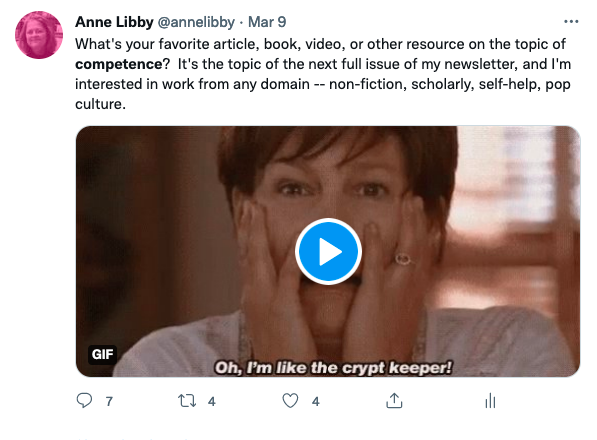Warm Take: I Second That Emotion. April 4, 2021

Having received a boatload of other people’s money, it’s typical for startup founders to learn that it’s actually difficult to start and run a company.
In tech, this has been positioned as some kind of special insight. It has given rise to many CEO blog posts, tweets, books, and more. You could call it a genre, It’s Hard, where you’ll find some lessons learned that led to transformational growth. You’ll also find CEOs and their emotions.
Gimlet CEO Alex Blumberg’s origin story for Gimlet Media was told in the first season of Startup, starting back in 2014. I was definitely listening. One particular segment stuck with me. Alex awoke in dark of night. Unable to sleep, he made an audio journal, of sorts, about his anxieties and feelings.
An emotional roller coaster may be an opportunity for good audio storytelling. An emotional roller coaster is unlikely to make an environment where everyone can flourish.
Yesterday I went looking for the episode I had remembered. I didn’t find it. Instead, I found Our Company Has Problems, from 2019, ostensibly about the lead-up to Spotify’s acquisition of Gimlet.
In one plot point, a co-founder told Alex, “This is a f*@king business and not a feelings factory.” Alex’s co-founder is wrong. Work is absolutely a feelings factory. We all bring in our hopes, dreams, fears to the job, every single day.
Emotions are also contagious; positional power renders a leader’s emotions more than simply contagious. There’s a sort of people’s mic effect around a leader, and it serves to amplify their projected emotions.
Your own negative emotions are last thing you want your organization to 10X.
Enter emotional intelligence, a key leadership competency. Often called EQ, it’s a set of learnable skills that enable you to set healthy boundaries between what you’re actually feeling, and how you should respond.
While I have recommended Daniel Goleman’s classic Emotional Intelligence over the years, it has been more than 15 years since I revisited the book. I should.
Here’s a quick tour of Karol M. Wasylyshyn’s explanation of the components of emotional intelligence:
Self observation: The awareness of our emotions -- and their effects on others.*
Leaders have to understand more than how we feel; we must learn to see how our emotions operate in the teams we lead.
Self management: The ability to control emotions, and to channel them as a resource for achieving work and life objectives.*
This doesn’t mean that you can never be angry, sad, or anxious. It does mean that you need to take care with when, how, and with whom you share what you feel.
How does what you’re communicating keep your team moving forward? How does it inspire people’s best work?
Attunement: A genuine focus on others’ concerns. Being tuned into organization culture factors.*
Attunement is not empathy. Empathy is about appreciating other people’s feelings. When our own feelings about people’s feelings stop us from acting, things can go sideways.
Attunement requires us to be curious about people on our teams, and seek to understand and act on their concerns. Not on their feelings.
An organization centered on its leader’s feelings and needs is not going to be sustainable, for anyone. (Including, sometimes, the leader.)
Relationship Traction - The capacity to form relationships that are “real” not just transactional. Sufficient emotional understanding to build collaborative teams that deliver results.*
Relationship traction is a result, imo. As you practice self observation, self management and attunement your relationships deepen. Some external, process-based practices, like thoughtful, regular 1:1 meetings can also strengthen your relationships.
Over time, learning and practicing the components of emotional intelligence can create a virtuous developmental circle — one that positions you to enable others to do their best work. This is the whole point of people management.
*all quotes from Karol Wasylyshyn’s presentation Executive Coaching with Top Leaders: An Inside Look, posted at Karol’s website.
This is one of my Warm Takes, which I usually write while drinking coffee on Sunday morning, often in response to something I read, or something I’m trying to work out.
This time it’s both: I’m thinking about competence for a future issue of the newsletter; also, the entire story I’ve read on the internet about Gimlet, some of which you can read about in Nick Quah’s What Went Wrong at Gimlet?
Addendum
This email went out on April 4, 2021. On April 12, The New Yorker published a piece on the legacy of Goleman's book, The Repressive Politics of Emotional Intelligence, by Merve Emre (probably paywalled.) I wanted to revisit the book, Emre did. Her commentary was worth my time, reminding me that anything can be weaponized. Lol/sigh, and in the right hands, any idea can be monetized.
Do weaponization and monetization go together, like...peanut butter and chocolate?

Thank you for inviting me to your inbox. Also for reading, questioning, challenging and otherwise engaging with my thoughts about people, work, and how we can make better and more human workplaces.
A big thanks to to the lovely people who pay to support On Management.
May you and your loved ones be safe, healthy, and free.
Anne Libby
P.S. Like many issues of On Management, this one was updated after the newsletter drop.





